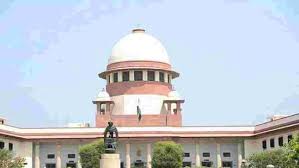CURRENT AFFAIRS
Get the most updated and recent current affair content on Padhaikaro.com
Appointment of Supreme Court Judges
- Vaid's ICS, Lucknow
- 03, Sep 2021

Why in News:
- Nine new Supreme Court judges were administered their oaths of office by Chief Justice NV Ramana.
About
- It is for the first time in the history of the Supreme Court that nine judges took the oath of office at one go.
- With the swearing-in of the nine new judges, the strength of the Supreme Court has now increased to 33, including the CJI, out of the sanctioned strength of 34.
- It was the first time the Supreme Court allowed a live telecast of the ceremony.
Collegium System
- It is the system of appointment and transfer of judges that has evolved through judgments of the Supreme Court, and not by an Act of Parliament or by a provision of the Constitution.
- The Supreme Court collegium is headed by the Chief Justice of India and comprises four other senior-most judges of the court.
- A High Court collegium is led by its Chief Justice and four other senior-most judges of that court.
- Names recommended for appointment by a High Court collegium reaches the government only after approval by the CJI and the Supreme Court collegium.
- Judges of the higher judiciary are appointed only through the collegium system, and the government has a role only after names have been decided by the collegium.
Evolution:
- The collegium system has its genesis in a series of Supreme Court judgments called the ‘Judges Cases’.
FIRST JUDGES CASE: In S P Gupta Vs Union of India, 1981, the Supreme Court judgment held that consultation does not mean concurrence and it only implies an exchange of views.
SECOND JUDGES CASE: In The Supreme Court Advocates-on-Record Association Vs Union of India, 1993, a nine-judge Constitution Bench overruled the decision and devised a specific procedure called ‘Collegium System’ for the appointment and transfer of judges in the higher judiciary.
-
-
- The majority verdict in the Second Judges Case accorded primacy to the CJI in matters of appointment and transfers while also ruling that the term “consultation” would not diminish the primary role of the CJI in judicial appointments.
- The role of the CJI is primal in nature because this being a topic within the judicial family, the executive cannot have an equal say in the matter.
-
THIRD JUDGES CASE: In the Third Judges case (1998), the Court opined that the consultation process to be adopted by the Chief Justice of India requires ‘consultation of plurality judges’.
-
-
- The sole opinion of the CJI does not constitute the consultation process.
- He should consult a collegium of four senior-most judges of the Supreme Court and even if two judges give an adverse opinion, he should not send the recommendation to the government.
- The court held that the recommendation made by the chief justice of India without complying with the norms and requirements of the consultation process is not binding on the government.
-
Constitutional Provisions :
- Judges of the Supreme Court and High Courts are appointed by the President under Articles 124(2) and 217 of the Constitution.
- Article 124(2): Every Judge of the Supreme Court shall be appointed by the President by warrant under his hand and seal after consultation with such Judges of the Supreme Court and of the High Courts in the States as he may deem necessary.
- Article 217: Every Judge of a High Court shall be appointed by the President by warrant under his hand and seal after consultation with the Chief Justice of India, the Governor of the State, and, in the case of appointment of a Judge other than the Chief Justice, the Chief Justice of the High Court.
Facts for Prelims:
E-Gopala App
- The web version of the e-GOPALA application developed by the National Dairy Development Board (NDDB) has been launched to aid dairy farmers.
About
- e-GOPALA provides a platform to farmers in the country for managing livestock including buying and selling of disease-free germplasm in all forms (semen, embryos, etc), availability of quality breeding services (Artificial Insemination, veterinary first aid, vaccination, treatment etc) and guiding farmers for animal nutrition, treatment of animals using appropriate ayurvedic medicine/ethnoveterinary medicine.
Safe city index 2021
The fourth edition of the ‘Safe Cities Index 2021’ was released by the Economist Intelligence Unit (EIU) in August 2021.
- Important Facts: The index ranks 60 cities in 76 indicators covering 5 areas namely digital security, health security, infrastructure security, personal safety and environmental security.
- The capital of Denmark ‘Copenhagen’ is the safest city in the world. Yangon (Myanmar) is placed last (60th).
- The top cities in the index are- 1- Copenhagen, 2- Toronto, 3- Singapore, 4- Sydney, 5- Tokyo, 6- Amsterdam, 7- Wellington, 8- Hong Kong, 9- Melbourne, 10- Stockholm.
- Two Indian cities are included in this index out of 60 cities. Delhi is at 48th position and Mumbai at 50th.